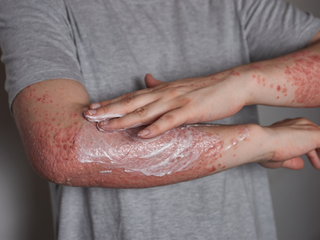Will Psoriasis Ever Go Away? Exploring Causes, Long-Term Remission & Natural Care
What Is the Reality of Living with Psoriasis?
One of the most common questions people with psoriasis ask is: Will my psoriasis ever go away? Since it is an autoimmune disorder, the answer is not straightforward.
A particularly heartbreaking case involved a young woman who was reassured as a child that her psoriasis would eventually disappear. For a time, it seemed to, but during the stress of her college exams at 20, she experienced a severe flare-up. The disappointment was overwhelming.
Psoriasis affects millions worldwide. While it is often said that psoriasis has no cure, the full picture is more nuanced. Can it go away in some cases?
This article explores the science behind psoriasis, why modern medicine considers it incurable, and how some individuals have managed to live psoriasis-free for years.
Why Does Modern Medicine Say Psoriasis Has No Cure?
Psoriasis is an autoimmune condition in which the immune system mistakenly attacks healthy skin cells, causing rapid cell turnover. This leads to red, scaly patches, inflammation, and discomfort. Because this immune response is chronic, it persists over time, making psoriasis a long-term condition.
Some dermatologists note that over time, patients may develop resistance to treatments like corticosteroids, making them less effective. Even newer biologic therapies can become less effective as the body develops antibodies against them. This contributes to the idea that psoriasis is incurable.
The exact cause of psoriasis remains unclear. While genetic, environmental, and immune-related triggers have been identified, the lack of a definite cause makes finding a permanent cure difficult.
While there is no medical cure for psoriasis, many people have experienced psoriasis long-term remission—some for years, even decades through consistent care and alternative methods. Understanding how this happens is key.

Can Ancient and Alternative Therapies Help Psoriasis?
Holistic care for psoriasis, such as Ayurveda and Traditional Chinese Medicine, looks beyond symptoms to address triggers like stress, diet, and inflammation.
For centuries, ancient civilizations have treated skin conditions like psoriasis using holistic approaches. Ayurveda, for example, considers psoriasis a result of an imbalance in doshas, leading to toxin buildup.
Similarly, Traditional Chinese Medicine (TCM) focuses on cooling the body’s “heat” and improving blood flow using herbal remedies. Many patients have found significant relief through these methods.
Another lesser-known alternative approach is aromatherapy, which involves blending plant oils for therapeutic benefits and applying them to affected areas.
Traditional treatments often include dietary changes and mindfulness practices. These holistic methods recognize that psoriasis, as an immune-related condition, requires a comprehensive healing approach.
Many individuals who have embraced these methods have seen their psoriasis drastically improve—or even disappear.
What Are Some Modern Holistic Approaches to Psoriasis?
Experts now link psoriasis and gut health, inflammation, and immune response. This has shifted focus toward lifestyle changes and natural treatments for psoriasis.
Many holistic practitioners emphasize the importance of gut health. A diet rich in fruits, vegetables, whole grains, and omega-3 fatty acids while avoiding alcohol, red meat, and processed foods may help manage psoriasis symptoms.
Topical applications of plant extracts like virgin olive oil, tea tree oil, and aloe vera have shown promise in soothing inflammation and reducing infection due to their antimicrobial properties.
Plant-based topical solutions, such as Oleum Cottage’s Activated Oils™, support skin barrier repair and help manage chronic skin conditions like psoriasis.Products like Oleum Cottage’s Activated Oils™, which are enriched with plant-based extracts and formulated for deep skin repair, offer a gentle yet effective alternative for soothing inflammation and supporting skin barrier health.
Mind-body therapies such as meditation and acupuncture have been associated with improvements in psoriasis symptoms, reinforcing the idea that holistic approaches should not be overlooked.
There is also phototherapy, which uses controlled UVB light exposure to reduce flare-ups. Some individuals combine this with dietary changes and report being symptom-free for years.

Real Customer Stories
At Oleum Cottage, many individuals struggling with severe psoriasis have experienced significant improvements using activated oils that nourish the skin and calm inflammation.
One customer, Mr. Ajay, had suffered from scalp psoriasis for nearly 15 years. After years of steroid creams, he switched to a natural, anti-inflammatory diet and began using therapeutic oil blends. He went two years without a single flare-up. His routine included the Oleum Cottage Scalp Psoriasis Care Bundle—specifically designed to target itchiness, flakes, and inflammation on the scalp and neck.
Another user, Meenal, dealt with psoriasis on her elbows. She found that reducing dairy and using targeted healing formulations provided relief she never thought possible. She followed a simple yet effective routine with the Ultra Healing Cream, crafted to calm localized flare-ups and deeply hydrate dry, irritated areas.
When people find a natural approach that works for them, consistency is key. Sticking to a regimen that balances lifestyle, diet, and skincare can lead to lasting improvements.
The Truth About Long-Term Healing
So, will psoriasis ever go away? The answer remains complex.
Medically, it is considered a chronic condition. However, through ancient wisdom, modern science, and lifestyle changes, some individuals have achieved long-term remission.
For those struggling with psoriasis, there is hope. The skin responds to how it is cared for, both internally and externally.


